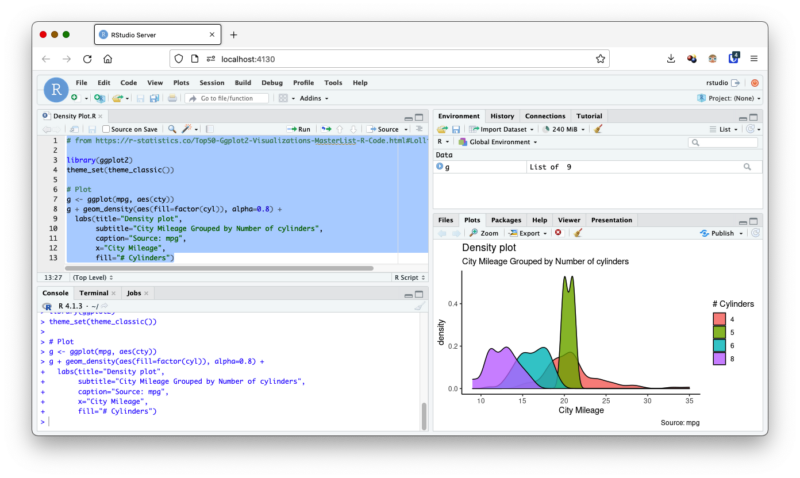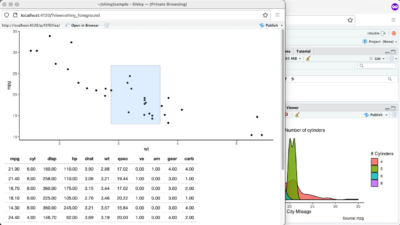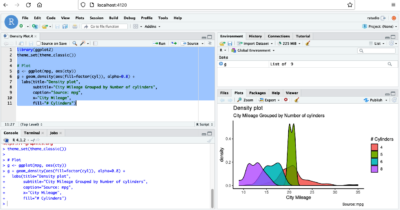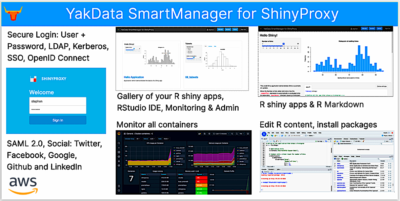You know that R 4.1.3 is out but don’t want to disrupt your current setup? Want to have multiple R versions with compartmentalized projects and libraries on your computer? Teaching people how to use R and need the entire class to all be on the same, easy-to-install system complete with R 4.1.3, RStudio Desktop, shiny dev environment, the tidyverse, geospatial tools, tex & publishing-related packages included?
🎉 YakData SmartDesktop with RStudio Server Open Source
The intelligent, portable, reproducible way to develop R programs, Shiny web apps & RMarkdown docs on your desktop. Includes R 4.1.3, the RStudio Desktop IDE, the tidyverse, verse, and geospatial-related tools from the R rocker-org project as a web app. All wrapped neatly into Docker via docker-compose. And since Docker is so incredibly ubiquitous, you know Windows, Mac, and Linux users will all be happy!
Get started on GitHub at Stephen-McDaniel/SmartDesktop-RStudio.
🚀 Features
+ YakData SmartDesktop with RStudio Desktop Server Open Source is the smart way to develop R programs, Shiny web apps & RMarkdown docs on your desktop. It includes R 4.1.3 from the Rocker project and the RStudio IDE as a web app wrapped neatly into Docker.
+ Save hours of time to get up and running with a complete desktop Rstudio Desktop IDE for R.
+ Includes over 200 of the most commonly used R packages pre-installed. Preloaded with the tidyverse, verse and geospatial-related tools from the R rocker-org project. Includes tex & publishing-related packages from verse.
+ Designed to install packages from RStudio Package Manager on a fixed date. Easily change this in Rprofile.site. Rapid installation of most packages as this image is based on Ubuntu.
+ Easy access to all the RStudio configuration and startup values.
+ The end of complex uninstall/upgrade paths for R and RStudio on your laptop/desktop system.
+ Easily recreate an identical environment on another system.
+ Run multiple versions of R side-by-side with multiple SmartDesktop project directories.
+ Define various environments for a particular R version with multiple docker-compose files.
+ Control resources used by your R sessions with docker-compose. No more system lock because an R session unexpectedly stole all your desktop resources.
+ Pause and restart a long-running R session with Docker Desktop!
🎉 Releases
4.1.3
Released March, 17th, 2022.
1. Upgrade R from 4.1.2 to 4.1.3.
2. Make permanent package installation the default path for new package installs via the RStudio UI.
3. Updated the R session start messages. This is customizable in the ./yakdata/config/R/Rprofile.site file.
4. Ran tests Using the main repository push to Github, I downloaded the main repository zip file and ran it per the documentation.
a. ✅ The R version is upgraded to 4.1.3.
b. ✅ Successfully ran the R sample program.
c. ✅ Successfully ran the shiny sample app, interacted with app.
d. ✅ Checked that the package install works as expected, using the permanent path by default.
e. ✅ Checked that session start messages work as expected.
4.1.2
Original release in February, 2022.
📷 Screenshots



🧰 Install and setup
Head over to https://github.com/Stephen-McDaniel/SmartDesktop-RStudio#-install-and-setup to get up and running with YakData SmartDesktop for RStudio.
If you benefit from this project, please click the ⭐ button on this GitHub repository and let your colleagues know about it.
⭐ Inspiration
+ RStudio Open Source Server IDE is a free, open-source IDE for R, Shiny apps and RMarkdown content.
+ The RStudio Open Source Server IDE is backed by years of development, feedback and releases.
+ Make it easy to create a reproducible, self-contained R development environment on any system.
📘 Docs
RStudio IDE repository: https://github.com/rstudio/rstudio
RStudio Package Manager: https://packagemanager.rstudio.com/client/#/
Docker Desktop: https://docs.docker.com/desktop/
🎡 Alternatives
Alternatives include self-install of the R, the RStudio IDE, tidyverse, verse and more directly on your OS.
👨🏼💻 About RStudio
RStudio is the leading development environment for R programming, R Shiny apps and RMaarkdown documents. Features include:
+ Highly customizable with powerful tools for R including a console, source editor, plot viewer, workspace management, integrated help, command history and more.
+ Execute code incrementally by line, by selected text or as a complete program.
+ Syntax highlighting editor with drop-down code completion.
+ Smooth integration of R Shiny app development including a local Shiny server and the ability to debug your app in a local browser.
+ RStudio Desktop in this project runs as a desktop server, ensuring reproducibility and portability.
🐳 Docker Desktop
Once you work with Docker Desktop, you will wonder why you wasted all those hours struggling with R installation directly on your computer!
+ Containerize and share any application locally and on your favorite cloud platform, in multiple languages and frameworks.
+ It is easy to install, setup and use a complete Docker development environment.
+ If you use a Windows computer, gain the ability to toggle between Linux and Windows Server environments ON YOUR LOCAL COMPUTER!
+ Volume mounting for code and data, including file change notifications and easy access to running containers on the localhost network.
🥇 The tidyverse

The tidyverse includes many leading R packages for data science, forecasting, analytics and data management. The developers state, “The tidyverse is an opinionated collection of R packages designed for data science. All packages share an underlying design philosophy, grammar, and data structures.”
A subset of the included packages: ggplot2, dplyr, tidyr, readr, purrr, tibble, stringr, forcats and many other packages with more specialized usage. They are not loaded automatically with library(tidyverse), so you’ll need to load each one with its own call to library().



